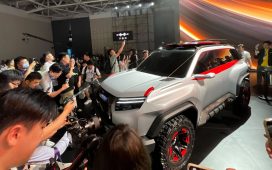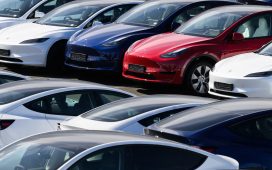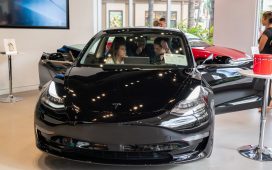Ford AV Argo autonomous vehicle test car
Source: Ford
The bloom is coming off the rose when it comes to expecting self-driving vehicles to zip around in large numbers. In fact, a new survey of experts in the auto and tech industries by J.D. Power shows the challenges of perfecting self-driving vehicles will keep autonomous vehicles from taking off anytime soon.
“It’s going to be around that decade-plus before that is going to be an option for consumers to purchase a self-driving vehicle,” said Kristin Kolodge, executive director, driver interaction & human machine interface research at J.D. Power.
Working with SurveyMonkey, J.D. Power polled more than 5,000 auto and tech experts as part of its first Mobility Confidence Index. The goal: measure what automotive and tech industry insiders think about the future of self-driving vehicles and compare those results with the opinion of more than 5,000 consumers who were also questioned at the same time in late June and early July.
In general, consumers think it will be close to a decade before self-driving vehicles are ready in variety of uses.
Among other findings in the survey:
- Auto and tech industry experts predict it will be at least 12 years before fully autonomous vehicles are being sold to private buyers.
- Industry insiders think robotaxis will not be ready for widespread public use until 2025.
- By 2034, autonomous vehicles will make up just 10% of all vehicles being bought and sold, they said.
The survey highlights one of biggest hurdles slowing development of self-driving vehicles: Getting the technology perfected so cars and trucks can maneuver everywhere without a driver. That realization may explain why some in the auto industry have dialed back their plans for launching robotaxis or self-driving cars and trucks.
Last week, General Motors subsidiary Cruise, postponed a planned launch of an autonomous ride-share service as it continues developing, validating and making sure its self-driving cars are ready.
“What’s most important when we do launch this service is that we do it the right way,” Cruise CEO Dan Ammann said.
Meanwhile, Tesla CEO Elon Musk is sticking with his forecast of 1 million Teslas capable of being robotaxis on the road by the end of next year.
“We will still need regulatory approval, but the capability will be there,” Musk told shareholders at the company’s annual meeting in June.
The J.D. Power Mobility Index also surveyed consumers and experts about their expectations for electric vehicles. Both groups believe it will be well past 2030 before there are as many electric vehicles on the road as gas-powered models. One reason many expect slow acceptance of EVs: The willingness of consumers to go electric.
“They recognize the benefit to the environment. That seems to be an unquestionable point,” said Kolodge. “But when it really comes down to, ‘would you as a consumer want to have a battery electric vehicle?’ That’s where we see the resistance.”








